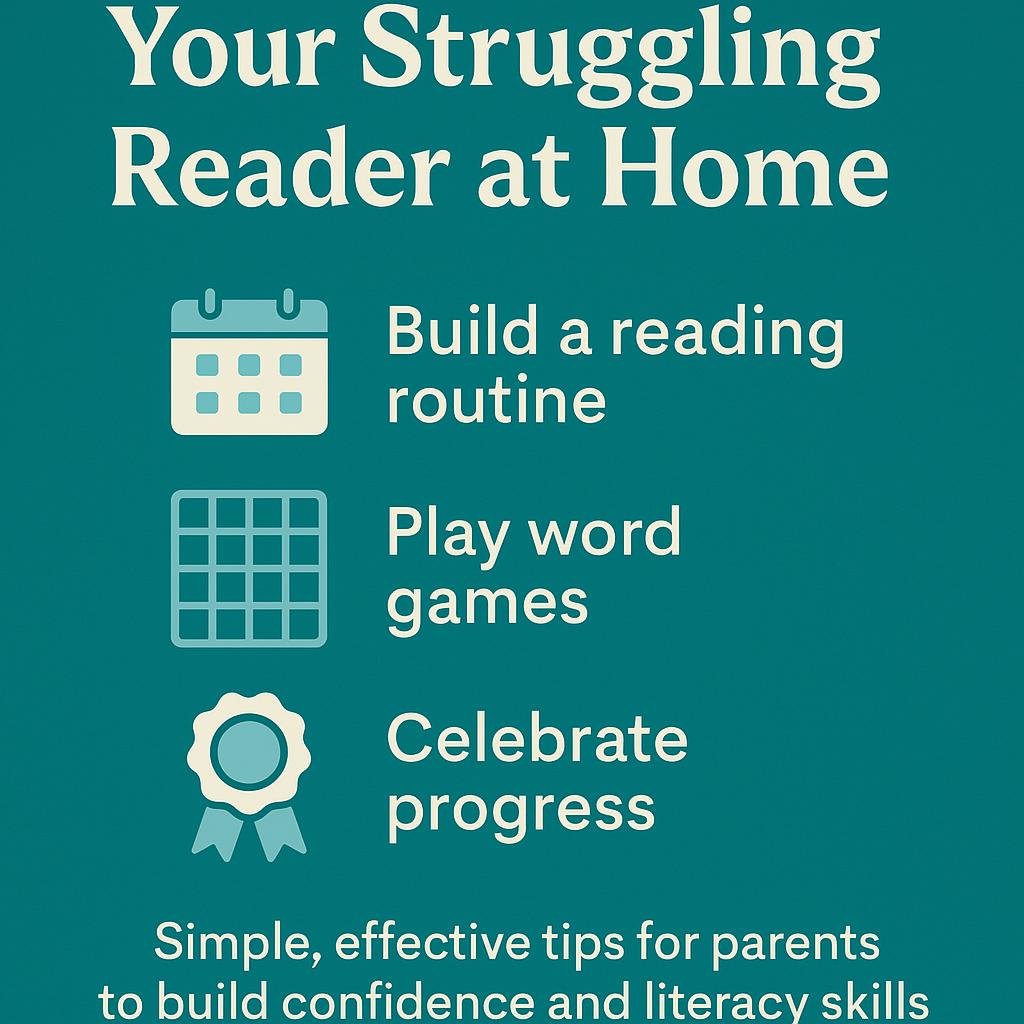How to Support Your Struggling Reader at Home
Teal graphic titled “How to Support Your Struggling Reader at Home,” with icons and tips highlighting routines, phonemic awareness, reading together, and celebrating progress—designed as a helpful visual guide for parents.
Simple, Effective Tips for Parents to Build Confidence and Literacy Skills
You Don’t Need to Be a Reading Expert to Make a Difference
If your child dreads reading aloud, avoids books, or melts down over spelling tests, you may feel helpless. But here’s the truth: you don’t have to fix everything—just create the conditions for success.
Even simple changes at home can support what your child is learning in tutoring or at school. With structure, patience, and encouragement, you can help your reader gain the confidence they need.
1. Build a Reading Routine
Kids thrive with routine—especially struggling readers. Create a consistent time each day for reading, even if it's just 10–15 minutes. Choose quiet, low-stress moments like after dinner or before bed.
📌 Tip: Let your child pick the book (even comics or audiobooks count!). The goal is to enjoy reading, not just “get through it.”
2. Read Aloud—Together
Reading to your child helps develop vocabulary, fluency, and listening comprehension. If they’re ready for it, try paired reading: you take turns reading every other paragraph or page.
📌 Tip: Start small. They read a sentence; you finish the paragraph or page. Let them try, and offer gentle support when they’re stuck or frustrated.
3. Focus on Sounds, Not Just Letters
Many struggling readers need help hearing and working with the individual sounds in words. This skill—called phonemic awareness—is a critical building block for reading success.
Try simple, playful word games like:
“What’s the first sound in mat?”
“Say sun without the /s/.”
“Change the /c/ in cat to /h/*—what’s the new word?”
“What are the sounds in flop?”
📌 Tip: These quick games are perfect for car rides, errands, or brushing teeth—no flashcards required!
4. Celebrate Progress (Not Perfection)
A struggling reader may feel like they’ll never “catch up.” That’s why small wins matter. Celebrate effort: “I noticed how you stuck with that word until you figured it out. That’s amazing!”
📌 Tip: Keep a “Reading Wins” notebook where you and your child record successes, no matter how small.
5. Partner With a Trained Literacy Tutor
As a parent, you can create a supportive environment—but you don’t have to do it alone. A trained tutor using evidence-based methods like EBLI can identify your child’s specific needs and teach them the skills they’ve been missing.
📌 At Growing Oaks, we focus on helping students of all ages become confident, capable readers—quickly and with care.
You're Not Alone—We're Here to Help
Reading shouldn’t be a daily battle. With the right support, your child can learn to read with confidence—and even joy.
✅ Personalized, one-on-one tutoring
✅ In-person and online sessions
✅ Support for dyslexia, spelling struggles, and more
Ready to Take the Next Step?
Your child deserves to thrive. We can help.
👉 Schedule a free consultation at growingoaks.us/appointments
Sources:
National Center on Improving Literacy. Family Resources. https://improvingliteracy.org/family
EBLI. Resources for Parents. https://eblireads.com/blog
Snow, C.E., Burns, M.S., & Griffin, P. (1998). Preventing Reading Difficulties in Young Children. National Academies Press.
